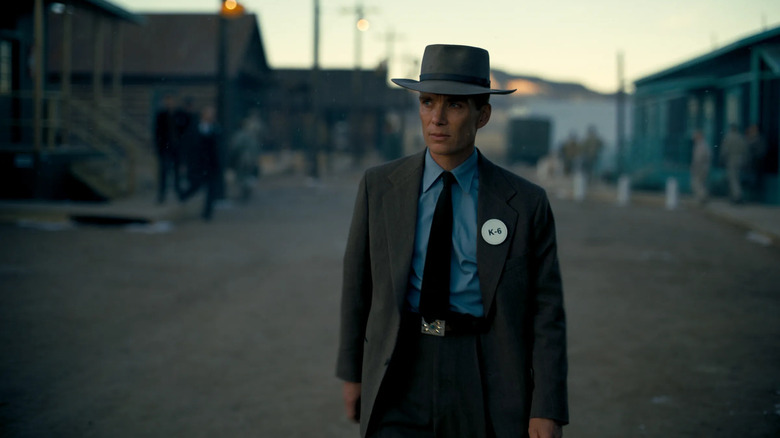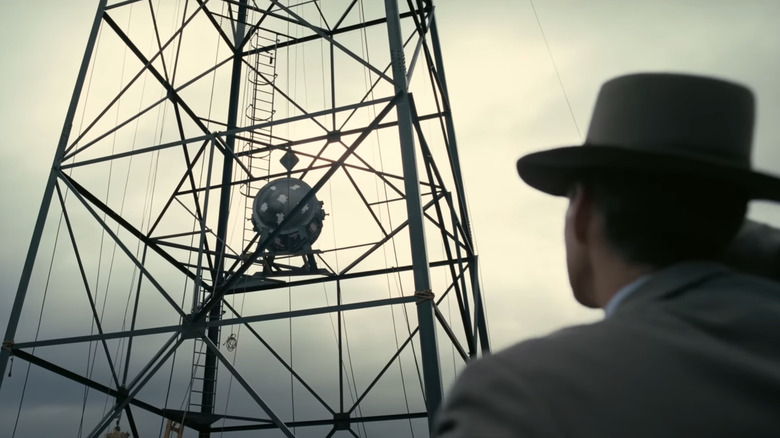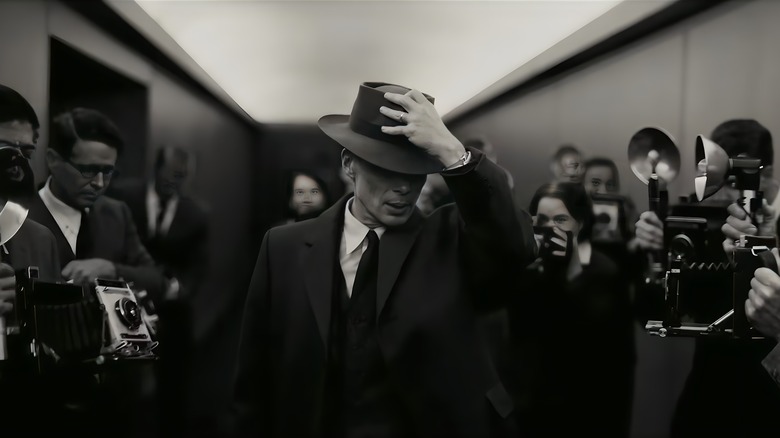One Of Oppenheimer's Most Stomach-Turning Moments Was Added By An Actor
Despite what some of the less informed commentary on "Oppenheimer" would have you believe, Christopher Nolan has not made a pro-nuclear bomb movie. Quite the opposite, in fact. With "Oppenheimer," the revered filmmaker set out to make what he dubbed a cinematic Rorschach test, designed to put the onus on audiences to determine how they felt about J. Robert Oppenheimer and his creation of the atomic bomb. Adapted from Kai Bird and Martin J. Sherwin's Pulitzer Prize-winning biography "American Prometheus," Nolan's latest makes a point of not making any overarching point, letting the facts speak for themselves.
However, not all those facts are, well, facts. There are several historical facts that "Oppenheimer" ignores, including the reality of the physicist's decision to poison his supervisor at Cambridge, which was only prevented by his parents' decision to step in and not by Oppie's own guilt. That's a pretty stomach-turning insight into the man's mental instability at the time.
Equally as stomach-turning is the moment in the movie when James Remar's Secretary of War, Henry Stimson, suggests the US not bomb Kyoto because he and his wife honeymooned there. Such glibness amid the weight of these decisions is startling and, much like the majority of "Oppenheimer," upsetting for what it seemingly reveals about humans' proclivity for cruelty and capriciousness. But this looks to have been yet another moment where the historical facts were massaged slightly by Nolan, who in this instance was actually influenced by one of his performers.
'No one in the room knows how to react'
In a film full of sobering historical recreations, the scene where several government and military members must decide where to drop the atomic bomb is memorable for Henry Stimson's flippancy. As Harry S. Truman's Secretary of War, Stimson was uniquely placed to influence the course of history in this moment, and in "Oppenheimer" is shown telling his colleagues that they should avoid bombing Kyoto due to its cultural significance, before revealing that he also previously honeymooned in the Japanese city with his wife.
According to Christopher Nolan, this comment wasn't originally in the script. The director, who'd written the "Oppenheimer" screenplay entirely in the first person, was actually moved to change Stimson's dialogue after hearing from James Remar himself. As the filmmaker told The New York Times:
"There's a moment where James Remar [...] kept talking to me about how he learned that Stimson and his wife had honeymooned in Kyoto. And that was one of the reasons that Stimson took Kyoto off the list to be bombed. I had him crossing the city off the list because of its cultural significance, but I'm like, 'just add that.' It's a fantastically exciting moment where no one in the room knows how to react."
Although the addition of this extra comment isn't entirely accurate (more on that later), it certainly tied into Nolan's mission to produce his Rorschach test of a film, eliciting a stunned response where, as the director notes, "no one in the room knows how to react," which in turn leads to the same reaction among viewers.
The reality
As per the BBC, Kyoto is Japan's ancient capital and plays host to 2,000 Buddhist temples and Shinto shrines, alongside 17 World Heritage Sites. It was, as Henry Stimson says in the film, of major cultural significance. Which it turns out is pretty much the reason for the Secretary of War's decision to push Harry S. Truman (played by Gary Oldman in "Oppenheimer) and his administration to bomb Nagasaki instead of Kyoto.
As Alex Wellerstein, a historian of science at the Stevens Institute of Technology, told the BBC, "Kyoto was seen as an ideal target by the military because it had not been bombed at all, so many of the industries were relocated and some major factories were there." When Stimson argued against bombing the ancient Japanese capital, he was met with resistance. Wallerstein continued, "The military didn't want it removed so it kept putting Kyoto back on the list until late July but Stimson went directly to President Truman."
At no point was Stimson's honeymoon deemed to be a deciding factor in his actions. In fact, it's not even clear that he honeymooned in Kyoto. Stimson had visited the city multiple times in the 1920s, however, and having first-hand knowledge of its environs may have influenced his decisions. What is clear is that Nolan took some liberties with James Remar's line in the "Oppenheimer" script. But in a sense, this particular issue isn't all that consequential as despite its many deviations from history, "Oppenheimer" remains a cautionary tale about humanity's remarkable talent for putting its own existence in peril.


